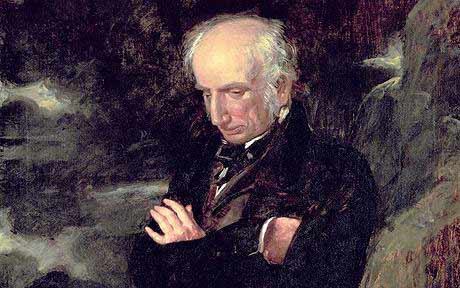|
 William Wordsworth: scientists are exploring the theory that people are drawn to certain trades and professions based on the connotations of their surnames. |
|
A person’s surname can influence their choice of career, experts believe. Scientists are exploring the theory that people are drawn to certain trades and professions based on the connotations of their surnames. The phenomenon can be observed among famous figures such as the World champion sprinter Usain Bolt or the 18th century poet William Wordsworth. However, serious research is now being dedicated to the concept – known as nominative determinism – to explain why it occurs. New Scientist magazine coined the term after observing that the subject matter of a series of science books and articles bore relevance to the authors’ surnames. John Hoyland, the magazine’s feedback editor, said: “A reader wrote in to tell me that they’d come across a paper on incontinence in the British Journal of Urology which was written by J W Splatt and D Weedon. “I had noticed, as it happens, on the same day in the office, a book on the arctic called Pole Positions: The Polar Regions and the Future of the Planet, by Daniel Snowman. “These two things went together in my mind and I thought there’s something going on here.” Research is now being undertaken in search of an explanation for the phenomenon. A paper in the Journal of Personality and Social Psychology has concluded that people are disproportionately likely to “choose careers whose labels resemble their names”. The paper entitled Why Susie Sells Seashells by the Seashore: Implicit Egotism and Major Life Decisions cites the disproportionate number of dentists called Denise or Dennis as an example of the trend. Authors Brett Pelham, Matthew Mirenberg and John Jones concluded that the phenomenon occurs because people “prefer things that are connected to the self (for example, the letters in one's name)”. (Read by Nelly Min. Nelly Min is a journalist at the China Daily Website.) (Agencies) |
专家认为,一个人的姓氏会对其职业选择产生影响。 科学家正在探讨的理论是,人们会根据自己姓氏的寓意被特定的行业和职业所吸引。 这一现象可以从一些名人身上观察到,如世界短跑冠军尤塞恩•博尔特和18世纪的诗人威廉•华兹华斯。 不过,科学家现在对这一概念进行了严肃认真的研究来解释为什么会发生这种现象,并称之为“姓名决定论”。 《新科学家》杂志注意到一系列科学书籍和文章中的主题多和作者的姓氏相关联,从而造出了“姓名决定论”一词。 杂志的反馈报告编辑约翰•霍伊兰德说:“一个读者写信到杂志来告诉我,他们在《英国泌尿学杂志》上看见了一篇有关大小便失禁的论文,作者是J W Splatt(与‘溅泼’splatter相近)和D Weedon(与‘撒尿’wee相近)。 “碰巧的是,就在同一天上班期间,我注意到一本关于北极的书《极地位置:极地地区和地球的未来》作者是丹尼尔•斯诺曼(雪人)。 “这两件事在脑中叠加在一起,于是我想,这里面一定有什么奥秘。” 目前科学家正在进行研究,以找到能解释这一现象的答案。一篇发表在《个性与社会心理学杂志》上的论文得出结论说,有相当多的一部分人倾向于“选择名称和自己名字相近的职业”。 这篇论文题为《为什么苏西在海岸边卖海贝:隐含的自我中心和重大的人生决定》,其中为了证明这一趋势援引的一个例子是,有相当多的一部分牙医名字叫Denise或Dennis(与“牙医”dentist相近)。 该论文的作者布雷特•佩尔汉姆、马修•麦仁伯格和约翰•琼斯得出结论说,发生这一现象是因为人们“偏爱那些和自身(如自己名字中的字母)有关的事物”。 相关阅读 (中国日报网英语点津 陈丹妮 编辑:Julie) |
|
Vocabulary: come across: 偶然碰到或发现 implicit: 内含的;含蓄的 egotism: 自我中心 |
